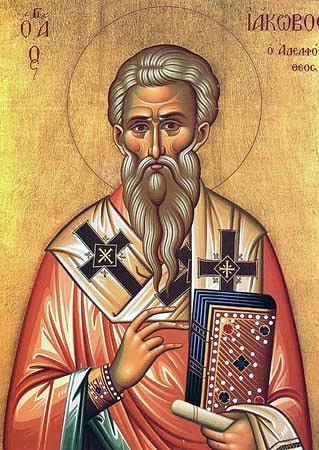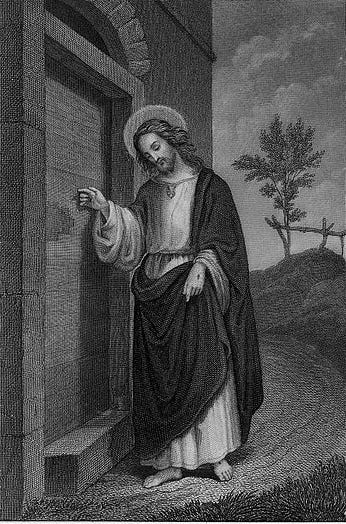Turning the Doorknob of Faith
A lesson on knowing the Savior from the example of James the Just
James, the brother of Jesus, grew up in the same household as Jesus. He was familiar with Jesus' teachings and even the claims of His miracles. Yet, despite being as close to Jesus as anyone on earth at that time, he didn’t believe in the divine aspects of his brother. He knew his brother as Jesus but did not know Him as the promised Savior. It wasn’t until after the death and resurrection of Jesus that James had a full conversion of heart due to a personal spiritual experience he had with the resurrected Savior. As recorded in the Bible, "Then he appeared to James, then to all the apostles" (1 Corinthians 15:7, NIV). From that pivotal moment on, James became one of the most stalwart defenders of the faith and a powerful testifier of Jesus' divine mission.
Eusebius, an early church historian, tells us that James was sometimes referred to as "Old Camel Knees" due to the calluses he developed from being on his knees so often in prayer. He was also known as “James the Just” for his righteousness. James served as the first bishop of Jerusalem and met a martyr's death when he was thrown from the pinnacle of the temple and then beaten to death with a club.
For me, one of the clearest evidences of the truthfulness of the resurrection of Jesus is the deep conversion that James experienced from Savior’s personal visit to James after the resurrection.
Many of us can relate to James in that we know of Jesus—we know who He is. We know His titles, some basic historical context of His life, His words, core teachings, and claims of His miracles. We quote Him and we quote scholars, teachers, and pastors who quote him, but do we truly know Jesus the Savior? To know Jesus the Savior and not just Jesus the man, as James eventually did, we must have a personal spiritual encounter with Him, as James did. For James, it was the manifestation of the resurrected Jesus. For others, this personal manifestation often comes through special spiritual experiences that occur through moments of sincere prayer, meditation, and study of Jesus' words, coupled with a deep desire to know Him. When this knowledge distills upon the earnest seeker of truth, they begin to know Jesus the Savior, beyond merely Jesus the man.
Turn the Doorknob
In Revelation 3:20, we read, "Here I am! I stand at the door and knock. If anyone hears my voice and opens the door, I will come in and eat with that person, and they with me." What is this door? What is its meaning? The fact that the Savior has come to your door and isn't requiring you to come to His indicates that although He beckons us to follow Him, He has come to the threshold of our domain. We must demonstrate our willingness to simply turn the doorknob. The doorknob turns when we sincerely pray, ponder the words of the Savior, and love our neighbors. Knowing who the historical Jesus is and merely going through the motions of devotion without the emotion of devotion isn’t enough. Being present in the Lord’s house isn’t enough. It certainly wasn’t enough for James, who was literally part of the household of Jesus. Like James, we must experience moments of personal devotion with Jesus in order to know Him as the Savior. Sometimes, these spiritual moments that result in knowing the Savior come as a complete surprise, like with Paul or James. For others, they come as a result of earnest seeking. In any case, the invitation remains for us to open the door as He patiently stands at the threshold.
Ukrainian Refugee
Years ago, as a university student, I conducted research in Kiev, Ukraine. During my time there, I was assigned a translator named Diana, who was also a university student. When my research concluded, I stayed in touch with Diana as our lives progressed on different paths. She eventually married a PhD student from Kiev, and together they have a now five-year-old daughter.
When the conflict with Russia emerged in Ukraine, I was especially concerned for Diana and my other friends in the region. I made regular calls and sent messages to Diana to continually monitor her progress and the safety of her family. During a bombing raid one night, she fled with her daughter to the train station to get on the first train—or any train—that was leaving the country. Her husband had to stay behind because he was of military age and wasn’t permitted to leave the country.
As Diana tells it, when she arrived at the train station with her daughter, it was a scene reminiscent of Schindler’s List. There was pandemonium. Throngs of people were pouring into the train station, all with the same goal: to leave Ukraine immediately. With a suitcase in one hand and her daughter in her other arm, Diana managed to board a departing train. She didn’t even know where it was going, just that it was going away. Eventually, the train took them to Moldova, and now she has made her way to Romania. This was over a year ago, and I continue to visit with Diana at least weekly to encourage her along. Her husband has since been drafted and is now assigned to a unit near the border of Belarus.
Devotion with Emotion
In one of our recent conversations, she mentioned that when she boarded the train that day in Kiev, amongst the pandemonium of panicked crowds, bomb sirens, and having to say goodbye to her husband and home for who-knows-how-long, she had decided that God must not exist. How could He? Yet, while she was on that train, in a moment of final desperation, she turned to God through a prayerful plea for help. From that little act of devotion, though packed with big emotion, she experienced a spiritual, transformational awakening that still persists to this day. She boarded the train nearly agnostic and disembarked in Moldova utterly convinced of the reality of Jesus the Savior and His abiding love for her and her little family.
We are taught in the Gospel of John that the Savior already knows us. And His knowledge of us isn't just knowledge of our demographic info, metadata of our life’s transactions, and all things regarding what we're up to. He knows us as a shepherd knows his sheep, as a potter knows his pots, and as a gardener knows each plant in their care. It's our turn, to show Him that we are willing to know Him, as James finally did. . . as Diana did . . . and as millions of Christians throughout history have done and continue to do.
As we press forward in our personal quests to know the Savior, we too can find inspiration from James and from others around us. It doesn’t take a lot of effort to turn the doorknob, but it does require sincere effort. The beautiful thing is that the Savior is already there, waiting for us on the other side of the door. §







